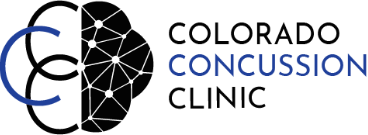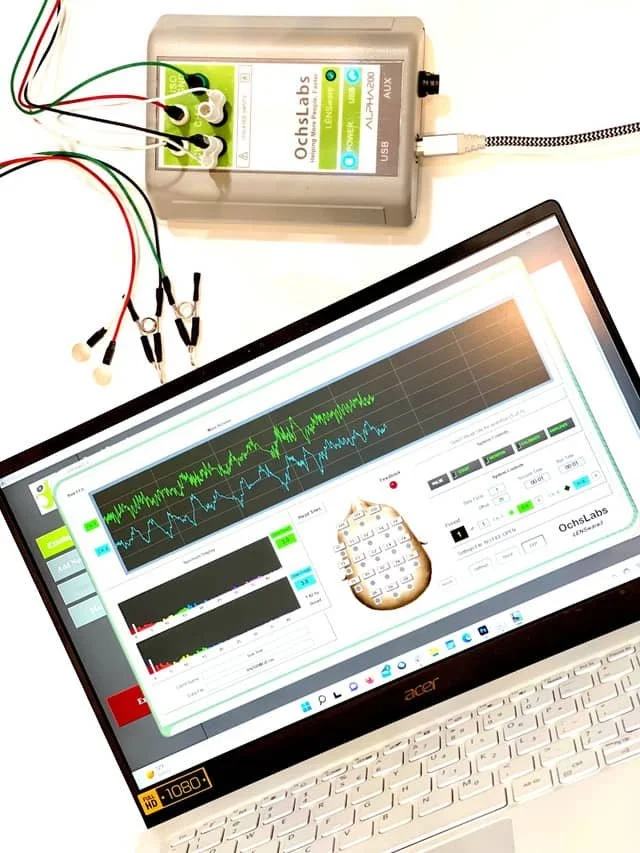Living with Lingering Symptoms After a Head Injury
If you’ve experienced a concussion or head injury, you know recovery can feel frustratingly slow. Even months later, you might still struggle with:
Poor cognitive function or brain fog
Trouble thinking or concentrating
Sensitivity to light, sound or movement
Mood changes like anxiety, irritability or depression
Anxiety, depression or irritability
Chronic headaches, chronic pain or body tension
Poor energy or sleep
For many patients, these symptoms can get worse over time after head injury and may not resolve even with rest, medication or therapy alone.
That’s where LENS neurofeedback, a form of brainwave disentrainment can make a big difference.
What Is LENS Neurofeedback?
LENS (Low Energy Neurofeedback System) is a gentle, non-invasive brain training method. It works by sending a tiny, imperceptible radiowave signal through sensors placed on the scalp. The brain picks up on this signal, which is small enough to get underneath neuroprotective filters. This signal helps the brain outline and sense its own functioning, and the brain responds (the feedback) by releasing “stuck” and inefficient patterning created by injury or trauma.
Think of Traumatic Brain Injury like a traffic jam in the brain: after an accident, your brain compensates by protecting and slowing down blood flow and neural pathways around the injury, causing symptoms such as reduced cognitive functioning, headaches and brain/body scrambling.
Slowing down in one part of the brain affects other areas, and eventually entire areas of ‘the city’ become less efficient. It takes more and more energy to function in your life and things that were once easy, become a chore.
The LENS acts like traffic control, helping the brain sense these inefficiencies and access new resources (increased blood flow, neural signaling) to heal.
Your own brain provides the feedback, as it traces the tiny signal from LENS and exercises out of stuck, inefficient pathways.
How LENS Supports Concussion Recovery
Reduces Stress on the Body and the Brain – LENS is FDA cleared for Stress. The LENS calms overactive fight-or-flight responses, giving your brain and nervous system the support it needs to regulate and repair itself.
Restores Clarity – Patients often report clearer thinking, better focus, increased concentration and reduced brain fog.
Improves Sleep & Mood – By helping regulate the nervous system, LENS supports better sleep patterns and emotional balance.
Accelerates Progress in Therapy – When your brain is less stuck,it becomes receptive again to other treatments (cognitive, speech, vision, or physical therapy) often become more effective.
Releases NeuroMuscular Tension + Trauma Patterning - After an accident, the biggest challenge to the brain is the body. When the brain senses motor trauma, or neuromuscular patterns of gripping in response to an accident, functioning slows. The LENS can also be used on the body to release muscle tension, directly influencing the nervous system to repair neuromuscular or structural issues, recover from panic, anxiety or PTSD and reduce chronic pain signaling.
What to Expect in a Session
Small sensors are placed on the scalp and ears.
The system measures brainwave activity and sends back a signal slightly offset from what it reads.
Sessions are very brief — often just a few minutes of stimulation.
Entirely Passive! Patients don’t need to “do” anything — your brain does the work.
Most people find the process relaxing, and depending on sensitivity, patients experience gradual or faster changes in mood, energy and cognition as the nervous system reorganizes.
For 24-48 hours after a session, patients might experience responses based on nervous system changes such as: changes in energy, sleep, brief echoes of past symptoms, increased dreaming, or in the case of trauma - the release of memories without much emotional content.
Is LENS Right for Post-Concussion Symptoms?
If you’re still experiencing headaches, brain fog, cognitive slowing, mood swings, or sensitivity after a concussion, LENS may help.
Talk to your doctor and wait at least 2-4 weeks after a major concussion to give your brain time to rebalance, and then try a LENS session. It’s especially supportive when nothing else has worked, or for people who feel stuck in recovery. The LENS can even be helpful for people who are too sensitive to tolerate more stimulating therapies.
Citations:
Hammond, 2007 (Anosmia). Case reversal of anosmia post-head injury with LENS.
Hammond, 2010 (QEEG TBI case). Quantitative EEG improvement post-LENS.
ISNR Journal 2006 issues. Multiple TBI-related LENS case series.
Larsen, 2009. Theoretical fit of LENS for TBI.
Nelson & Esty, 2012. Veterans with TBI/PTSD – symptom reduction.
Nelson & Esty, 2015. Chronic TBI-related headaches improved with FNS.
Schoenberger et al., 2001. Early randomized trial—FNS in mild to moderate TBI.
St. Clair, 2008. TBI from AVM – LENS application report.


